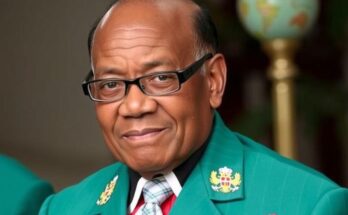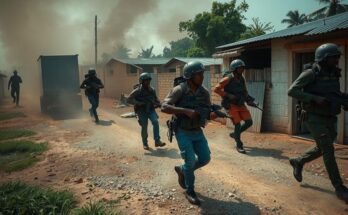Leicester City’s Wilfred Ndidi and his Nigeria teammates have claimed they are being held hostage at an airport in Libya after their flight was diverted. With over 12 hours without food or water, the Super Eagles announced their boycott of the upcoming qualifier against Libya due to concerns over safety and the alleged sabotage by the Libyan government.
Leicester City’s Wilfred Ndidi has made a grave allegation regarding the circumstances surrounding the Nigerian national football team as they find themselves stranded in Libya following a flight diversion. The Super Eagles were scheduled to travel to Benghazi for an Africa Cup of Nations qualifying match against Libya. However, their aircraft was unexpectedly rerouted and forced to land at Al-Abraq airport, located approximately four hours from their intended destination. The players have reported being left without sustenance for over 12 hours, with no access to food or water. They have also expressed concerns that the Libyan government may be attempting to undermine their ability to compete, stemming from previous complaints regarding ‘hostile treatment’ during a preceding match. The Nigerian team has subsequently declared their intention to boycott the upcoming fixture, citing their confinement within the airport terminal and the lack of viable alternatives for travel. Wilfred Ndidi articulated his dismay via social media, stating, “This is not football. Very embarrassing. Hostage to a national team. Disgrace.” Meanwhile, Victor Boniface, a forward for Bayer Leverkusen, took to Twitter to express frustration over the team’s predicament: “Been at the airport for almost 13 hours no food no wifi nowhere to sleep African we can do better.” William Troost-Ekong, a defender previously with Watford, provided a detailed account of the situation, revealing that they have been trapped at the airport for over 12 hours without basic necessities. He elucidated, “The Libyan government rescinded our approved landing in Benghazi with no reason. They’ve locked the airport gates and left us without phone connection, food or drink. All to play mind games.” Troost-Ekong further criticized the treatment, stating, “Even the Tunisian Pilot who thankfully managed to navigate the last minute change to an airport not fit for our plane to land had never seen something like this before.” He concluded by calling on the Nigerian government for intervention, asserting, “At this point we have called for our Nigerian Government to intervene and rescue us. As the captain together with the team we have decided that we will NOT play this game. CAF should look at the report and what is happening here.” The team is firm in their resolution to not remain in such conditions, even threatening to forfeit the match if necessary due to safety concerns. Troost-Ekong remarked, “We respect ourselves and respect our opponents when they are our guests in Nigeria. Mistakes happen but these things on purpose have nothing to do with international football.”
The Nigerian national football team, known as the Super Eagles, has been embroiled in a controversy surrounding their travel arrangements for an Africa Cup of Nations qualifier against Libya. The conflict highlights not only the challenges faced by athletes traveling in Africa but also raises questions regarding the treatment of sports teams by host nations. Concerns about the safety and welfare of players are paramount, particularly in high-stakes international matches.
The ongoing situation involving the Nigerian national team in Libya underscores significant issues regarding player safety and the treatment of visiting sports teams. The allegations of sabotage and the team’s resulting determination to potentially boycott the match reveal the gravity of their experience. As expressed by the players, the welfare of athletes remains a crucial matter that governing bodies like the Confederation of Africa Football (CAF) must address to ensure fair play and respect among competing nations.
Original Source: www.mirror.co.uk




